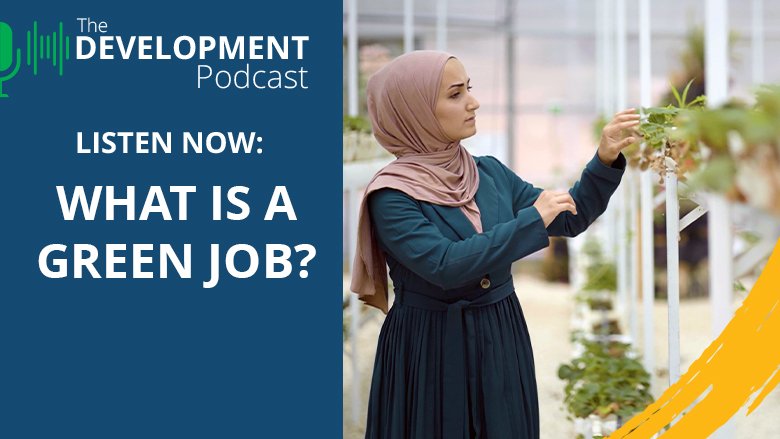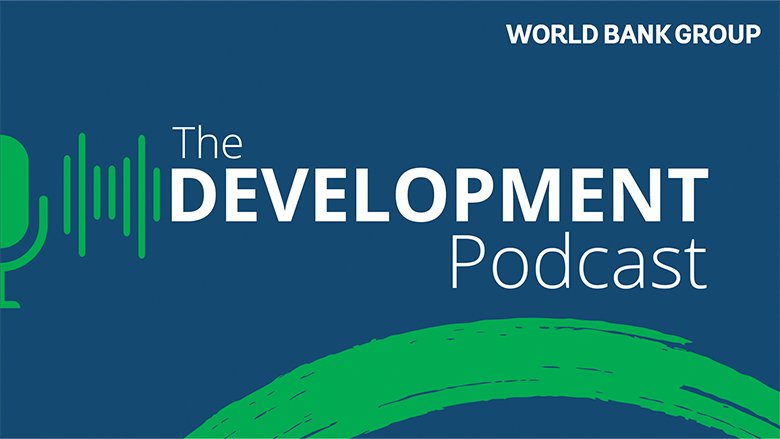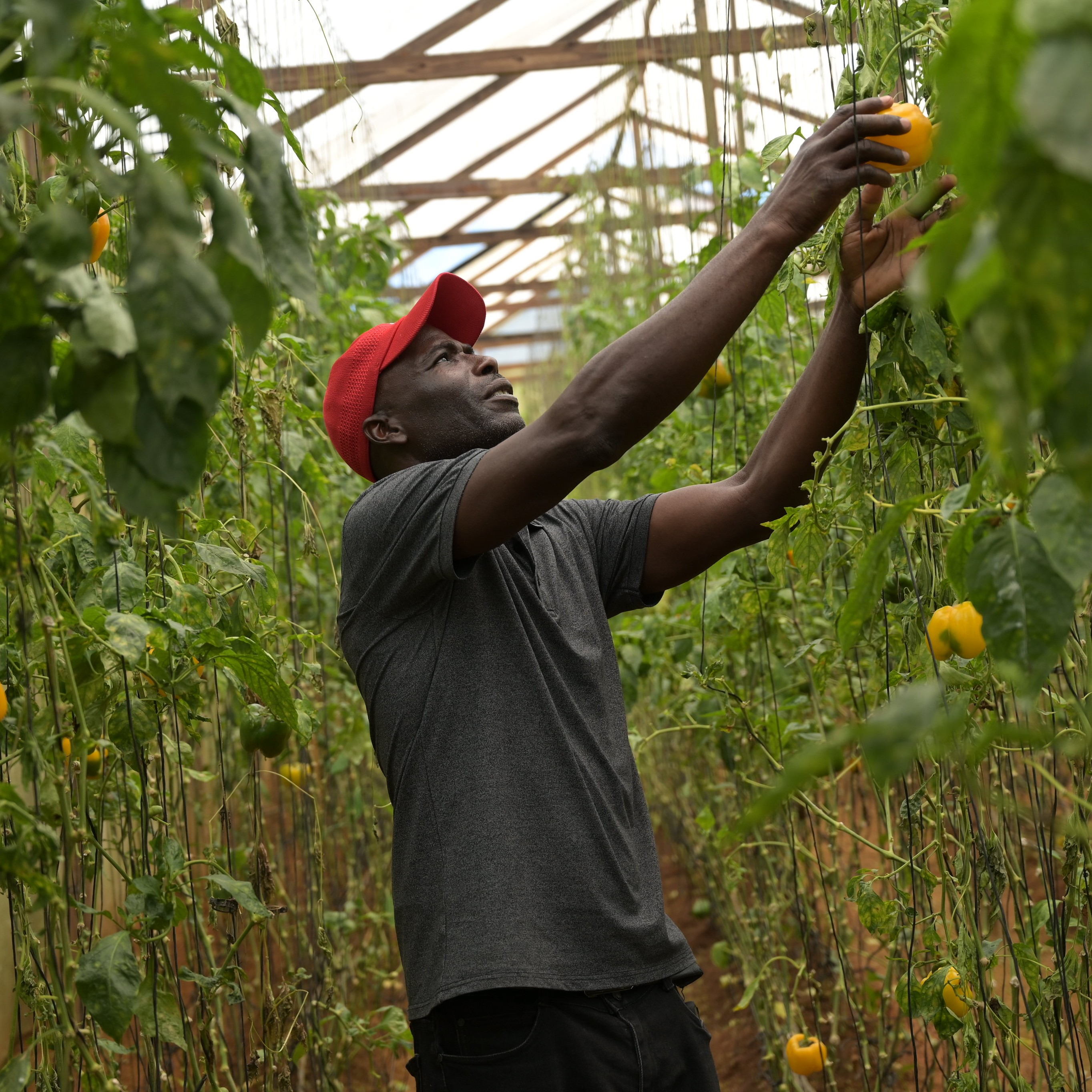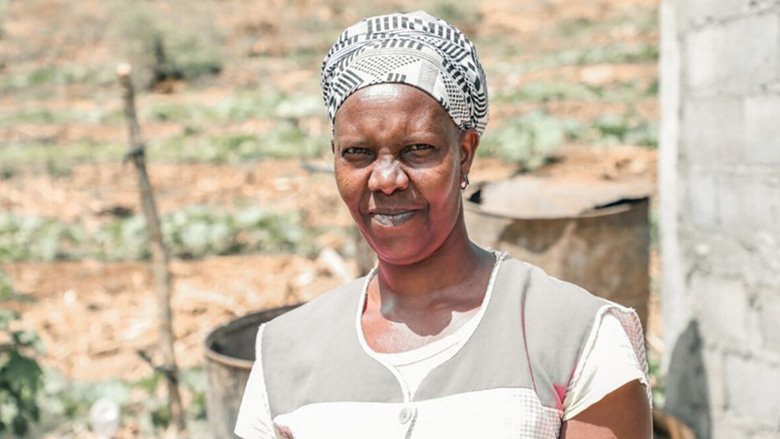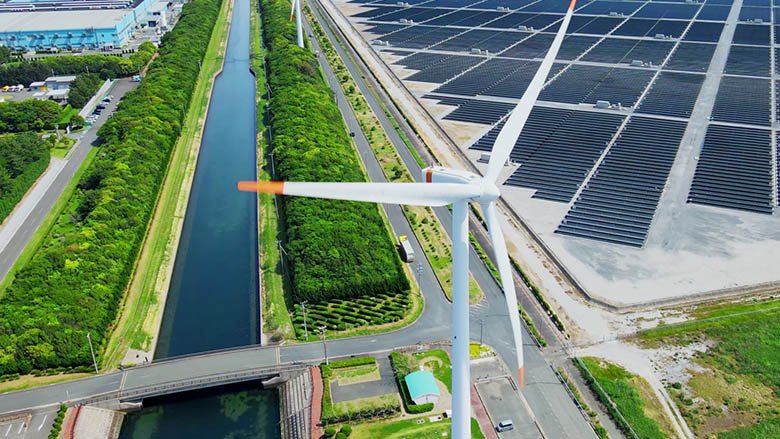The transition away from fossil fuels could create as many as 30 million ‘green’ jobs in clean energy and low-emissions technologies by 2030. So what is a ‘green job’? How can countries and companies support jobs that benefit people and the planet? And how can young people prepare for green jobs of the future?
Find out the answers to these questions and more as we speak with Ashish Khanna, Practice Manager, Energy and Extractives, West and Central Africa, World Bank; Manoj Sinha, CEO, Husk Power; Anubha Shukla, Global Director, Energy Efficient Devices, Husk Power; and Nidhi Pant, a 2023 winner of the UK’s Earthshot Prize and Co-Founder of S4S Technologies as they share their personal stories and examples on why investing in renewable energy is crucial in the fight to create world free of poverty on a livable planet.
Tell us what you think of our podcast here >>>. We would love to hear from you!
Featured Voices
- Ashish Khanna, Practice Manager, Energy and Extractives, West and Central Africa, World Bank
- Manoj Sinha, CEO, Husk Power
- Anubha Shukla, Vice President, D2R, Husk Power
- Nidhi Pant, a 2023 winner of the UK’s Earthshot Prize and Co-Founder of S4S Technologies
Transcript
[00:00] Srimathi Sridhar: Hello and welcome to the latest episode of The Development Podcast from the World Bank Group. I'm Srimathi Sridhar. In the third episode of our limited series exploring how to end poverty on a livable planet, we're asking the question, what is a green job? And where will the green jobs of the future lie? We'll be hearing about the impact of one groundbreaking renewable energy project in Nigeria, providing both power for millions of people in off grid communities, as well as thousands of jobs.
Manoj Sinha: In Nigeria, there are about 40 gigawatt of diesel generators that run every year. With this intervention, alongside the World Bank program, I think we can eliminate more than half of it in less than a decade.
Srimathi Sridhar: We'll hear the story of one young entrepreneur in India who tells us why green jobs unlock opportunities for women and rural communities.
Nidhi Pant: So I also feel that greener jobs also provide a lot of dignity to the women.
Srimathi Sridhar: And we'll get the view from the World Bank here in Washington DC about why green jobs matter and how the world can create more of them.
Ashish Khanna: More you can go to the ground, more you can actually provide a lot of hope and opportunity.
Srimathi Sridhar: Green jobs on a livable planet coming up on this episode of The Development Podcast from the World Bank Group. What makes a job green? And why are green jobs important? In many parts of the world, especially those with young populations, there is a need for employment and careers to have a positive impact when it comes to the climate. Every month, around 3.7 million young people globally reach working age, and a global transition to a green economy needs to provide opportunity for those young people without harming our warming world. The World Bank says that a green job is one which has environmental objectives, but green jobs are not confined to one sector and could be in renewable energy, green products, manufacturing, sustainable agriculture, the circular economy recycling, and more. Everyone from a solar engineer to an architect to a waste picker could have a green job. There is one sector though, where we've seen a quick uptick in green jobs, renewable energy. As more and more countries shift away from fossil fuels, green job opportunities will rise in renewables. We'll be hearing a little later on about the impact of renewable power on communities and livelihoods.
[02:49] But first, let's hear from one young woman in India who created a business with green jobs at its heart. Our producer, Sarah Treanor, found out more.
Sarah Treanor: The sound of temple bells in rural India as small holder women farmers are hard at work, cutting and placing their produce into a processing machine. The machine is powered by renewable energy, and it means that often off-grid agricultural communities can reduce food waste and boost their profits. I spoke to one of the founders of the company behind the machines.
Nidhi Pant: My name is Nidhi Pant. I'm the co-founder of S4S Technologies. S4S stands for Science For Society. I am dialing in from Aurangabad in Maharashtra, India. At S4S, we are working at this intersection of agriculture, energy access, and gender. So we work with small holder women farmers, and we empower them to be processors by helping them to convert whatever is their ugly imperfect produce for which they would not get the right price. So create an end-to-end ecosystems for farmers to convert their lower grade produce, which would go waste into food ingredients.
Sarah Treanor: I asked Nidhi to explain how she and her fellow co-founders came up with this idea, one which has gained international recognition, and even won a prestigious Earthshot prize. What was the problem they were all trying to solve? And why did they decide to focus their efforts on working with women?
Nidhi Pant: So in India, from your farm to your marketplace, there are a lot of losses due to storage, lack of infrastructure at the farm gate, not proper storage facilities, perishable nature of the produce, markets being very distant. And in the entire value chain, we lose food worth $14 billion. So that is such a huge problem, because at one end, we are losing so much of food, and on another end, there are one 26 million small holder farmers who are in poverty, they're not getting enough money from what their produce is, and women were the ones who are running the household, and also working on the farm. There were very limited livelihood opportunities staying in their villages.
Sarah Treanor: And you grew up in a farming community, didn't you? I think your family were farmers. Tell me a bit about that.
Nidhi Pant: Yes, my family is a farming family, but we migrated out of our village when I was very young. Our village is up in Himalayas. And before climate change was very always or was like a word, we were facing it because that was a very unstable geography. We had a lot of flood landslides always happening, and we had no access to markets. The logistics in these areas are very tough. So how are we actually going to create any manufacturing jobs? And what we have done is that we have made manufacturing possible very closer to the farm gate for these farmers to become more micro entrepreneurs by the use of technology, which is either solar powered, biomass based, alternate energy powered devices. And through this manufacturing, very closer to the farm, bringing manufacturing to villages, we are creating these green jobs.
Sarah Treanor: Nidhi says that green jobs can be boosted at every part of the value chain, from preventing food waste to green manufacturing to renewable power, and she's proud to be a part of it.
Nidhi Pant: So for us, this is what energy access does. This is what is a very true example of greener jobs. Give them something through which they can actually earn an additional income. This could be a food processing systems. This could be like a small textile industry. And don't call this as a cottage industry. That actually empowers the entire family. Apart from all of this, it just gives dignity of work. Today in India, green industry employs 18.5 million individuals, and there is an anticipation that we would be growing and adding around 4 million more jobs by FI25, so I'm really looking forward for all of us in India to getting more and more people into greener jobs.
[07:27] Srimathi Sridhar: Thanks Nidhi and Sarah. Well, as Nidhi mentioned there, skills in the engineering sector are pretty useful when it comes to green jobs, and it's fascinating to hear that women are at the heart of her business. But when it comes to the renewable energy workforce, women currently make up only around a third of employees. Our producer, Sarah, caught up with one female solar engineer who has been leading the way in this industry.
Anubha Shukla: Hi, Sarah. Thank you so much for having me here. My name is Anubha Shukla. I am currently the vice president of what we call the D2R, which is direct to rural business unit at Husk Power Systems, which is one of the world's largest mini-grid companies. In this role, I'm responsible for building and operating our AI powered platform, bringing energy products, such as energy efficient home appliances and productive use machines and energy services, which obviously includes reliable power supply to run these machines to rural consumers in India and Nigeria who don't often have access to either.
Sarah Treanor: I asked Anubha how has she became involved in the renewable power industry and what inspired her?
Anubha Shukla: I have personally always been a lover of science and technology. It started with my love of big machines and bigger automobiles that turned me into an engineer. And as I became older, I stopped seeing technology as something fascinating, and I started to see it as something that is used as a tool to fix problems. And there's no bigger problem for the world to fix today than the climate problem. The world is not going to be a very cozy, hospitable place in the future unless we do something about it today. And I think young people realize this more than anybody else. Millennials and Gen Z have lived in a world riddled with problems that the previous generations never had to see.
Sarah Treanor: And speaking of younger generations and those yet to enter the workforce perhaps, how important do you think green jobs will become?
Anubha Shukla: Renewable jobs are going to be a very important part of the growth story of any growing nation. The median age for India right now is 28 years, and the median age for Nigeria, another country that I worked with is 17 years. So there are a lot of people who are coming into new jobs into the workforce. It's not just about jobs for them. It's also about meaningful jobs. So we will have to be the ones that create these jobs for them. And I personally feel that renewable energy and young job seekers are a very obvious match. Personally, also, I feel that I found a lot of acceptance for me as a young woman in the solar space, because since it's a relatively newer industry, legacy jobs aren't as old or require as much experience as they would in any other industries that have existed for generations. The most meaningful part of my job honestly is seeing the actual change in lives that I bring, and I'm very proud of what we call powering prosperity wherever we work.
Sarah Treanor: And how does she view the appetite for a transition, perhaps away from fossil fuels and more traditional industries in India?
Anubha Shukla: So India is seeing a very visible change in terms of acceptance of green energy. If you look at it, India has about 180 gigawatts of installed renewable capacity. It is now looking at round the clock power solutions, which means complete move away from dependence on fossil fuels. India's pioneering development of electrical two wheelers in the world. There is now a new policy in place, brand new, to support installation of solar panels on households. So there's a lot happening in the green space in India. There is obviously a long, long way to go, but I'm pretty sure that we will get there. There was no better fit for me when I was younger than this industry. And now that I am older, and hopefully wiser, I am still certain that there is no better fit for me today.
[11:28] Srimathi Sridhar: Thanks, Anubha, for those insights. Well, Husk Power Systems where Anubha leads her team, as she mentioned, does a lot of work in Nigeria. And Nigeria in partnership with the World Bank Group is investing in a huge renewable energy project. It's called DARES, or the Distributed Access Through Renewable Energy, and it's on track to provide 17.5 million Nigerians with new or improved access to electricity. DARES will help with this through the Nigeria electrification project, which has installed 125 hybrid mini grids and utilized over a million solar home systems. This has created over 5,000 green jobs and has provided electricity to millions. I spoke to Manoj Sinha, founder and CEO of Husk to learn more. I started by asking him how he started in this industry and why.
Manoj Sinha: Great. Thank you, Sri, for having me here. Yes, I started this company with some of my co-founders back in 2008 in Bihar, which is my home state in India. The reason for starting this company emanated from the fact then that when I was growing up in Bihar, which is a state with 110 million people and about 70% did not have access to any power back then, I experienced that problem firsthand. I did have access to some electricity, while my first cousin and uncles and aunts, they didn't have access to electricity. I saw how much opportunity I got in first 20, 25 years of growing up while my cousins did not. Even today, they have not really even stepped into the middle class family of India. So it was a pretty stark difference of what opportunities can electricity bring if you have access to it versus not, given my personal and family experience.
Srimathi Sridhar: And how much of a challenge has it been to build a company and to convince people that this is an area worth investing in?
Manoj Sinha: The challenge is worth probably a book, so I can talk about it all day long. But if I have to summarize it going back 15 years when we were just starting, so we wanted to solve the problem for lack of electrification in the rural areas by actually keeping them in focus, and therefore we devised a new way of doing that, which is decentralized power generation and distribution, which is what mini-grid is, and connects all sorts of customers that include households, small businesses, small factories and such. So we have pioneered this method of decentralized electrification and distribution that focuses quietly on these rural people who are actually disproportionately adversely impacted by a lack of it. We didn't want to use fossil fuel because we wanted to be cognizant of climate change, and that's why we picked renewable energy, which was not in fashion, if you will, back in those days. We used biomass gasification system back then because solar PV was much, much, much more expensive than it is today. So that's how we started building our first couple of mini grids and started serving the first few hundred customers across two or three villages in Bihar. I remember very vividly, that when I was pitching to investors first time, I think in 2009, the first two or three slides, I had to just explain what a mini grid is. The good news now is that people at least know what a mini grid is, so I don't have to go back to that.
[15:10] Srimathi Sridhar: And tell me a bit more about Nigeria and the DARES program in particular.
Manoj Sinha: Nigeria is actually a great example of implementing forward-looking policies that addresses the lack of electrification in a way that never has to introduce fossil fuel that most of the global North or Western economies did in the past, right? And the method to do that is the mini-grids... So that's what is happening with this program that is enabling the process to happen at scale and speed. What is needed in Nigeria context is there are about 200 million people in total, and about 90 to 100 million people do not have access to any electricity, right? So the DARES program by the World Bank is an absolutely fantastic method to bring private public partnership to also bring more commercial investment alongside the DARES program that is already bringing a whole lot of capital to the economy that will enable not just, in my opinion, 17.5 million people to be electrified over the next decade, in my opinion, I think we can do the whole 100 million people electrification in a capital efficient and economic way. And very interestingly in Nigeria, there are about 40 gigawatt of diesel generators that run every year. With this intervention alongside the World Bank program, I think we can eliminate more than half of it in less than a decade. And that is going to be a tremendous positive impact on people's lives, and also the climate.
Srimathi Sridhar: What is the impact on a community of electrification?
Manoj Sinha: To give you a quick example of how I felt when I was in Nigeria in 2021, when I stepped out of the car in the village that we were going to electrify, I could smell the diesel in the air. I've been doing mini-grids for 15 years. I have never ever had that kind of experience, literally hundreds of diesel generators running in this village that I went to first time. And right after we electrified, that smell that hangs in there permanently just disappeared. Imagine the impact that must have had on people's health. And so that's what we are creating. And last point I want to make is people in the villages, in the rural parts of the world are disproportionately adversely impacted by climate change. And yes, they did not create the climate change, but they faced the major burden of climate change.
Srimathi Sridhar: Well, Manoj, it's been fascinating to hear about all of this, but I wanted to ask you, what is a green job to you? And what does it mean?
Manoj Sinha: There are a whole lot of avenues and trillions of dollars are going to get spent in the sustainability and renewable industry over the next decade or so. So opportunities are in abundance. We need to have our education, training, and curriculum changed to cater to that because this is massive. Massive amount of investment has to happen because we cannot afford to have climate change really create two degrees celsius plus temperature change, and all of us need to do our part. And green job actually is quite exciting. We are using, for example, at Husk, artificial intelligence to manage these 200 plus assets that we have spread across two continents. That is really a green job. We are applying artificial intelligence or predictive AI to be able to manage assets across two continents, which in my opinion, is very cool green job application that the next generation of software or hardware engineers can get excited about.
[19:11] Srimathi Sridhar: Manoj, fascinating insights there. Thank you again so much for joining us. Well, let's get the big picture now from the World Bank. I was joined in the studio here in Washington DC by Ashish Khanna, the World Bank's Practice Manager for Energy and Extractives. I started by asking Ashish to explain the link between green jobs and renewable energy.
Ashish Khanna: Thank you, Srimathi. I think there are two kinds of green jobs. One that is absolutely direct is, what does it take to actually get the number of people involved in doing a provision of mini-grid to a small town that does not have electricity through solar? And that will include jobs that are on creation of that mini-grid, maintenance of the solar. That tends to be roughly a very small set. The second set of green jobs, which is actually much more transformational in nature, is once you have the energy, what can that energy as an archery of development do?
[20:03] Srimathi Sridhar: Yeah, absolutely. And the DARES Nigeria project, of course, is a project that will expand access to clean energy for 17.5 million people. So tell me more about the kind of impact that this project in particular has had, both in terms of access to electricity but also in opening up jobs.
Ashish Khanna: Let me first begin, if you don't mind, by giving a little bit of a perspective on what's unique about DARES. So DARES is a platform that was launched at COP27 in Sharm El-Sheikh by us because the activities of different donors and governments were disaggregated, and the sum of the parts was less than what should have been. So we said, why don't we come together and launch a coordinated platform so that all meaning grids, all solar home systems, which are like right from a lantern to an appliance, but also health and education because neither health facilities nor education facilities, less than 20% of them have energy access. Then farmers, as food security in Africa requires energy, so powering of farmers. And then a lot of innovation. So all these five segments were pulled together and launched as a platform. Let me also say what's unique about Sub-Saharan Africa. Growing up in India and in Vietnam and China, almost everybody has grid-based power. Unfortunately, the size of Africa, how geographically dispersed it is and the technology, almost 40% of 600 million people who do not have access to power are going to get it from off-grid sources, and therefore it is super important that we have the right business models. So what is Nigeria DARES doing? Nigeria DARES is one of the first initiatives that has all the five segments. It's also a project in which a smaller component of $750 million from World Bank is enabling $1 billion from the private sector because the work will all be done by private sector, and that's where the jobs are. Jobs are not with the government. But it also leverages almost $400 million from other people. Who are these other people? Philanthropies, Global Energy Alliance, Sustainable Energy For All, Japanese JICA, and even IFC. Everyone is coming together and saying, "Here is a platform. Private sector, come and unleash your forces." ILO estimates that if Nigeria were to implement its national determined contribution, which is what they say on climate change, almost 12 million jobs can be generated by 2035.
[22:43] Srimathi Sridhar: Speaking of this, what are some of the specific sorts of green jobs that you see emerging then in this space, and what's been the role of the local community in terms of innovation behind some of the business models of how all of this works?
Ashish Khanna: So I was in Nigeria four months back, and I went just two hours drive away from Abuja on the first interconnected mini-grid that was commissioned. What is interconnected mini grid? Interconnected mini grid means those people who own paper have access to power, but actually unfortunately really don't have either, A, electricity coming into their homes, or hardly having two to four hours of supply. So there was a private sector that came in, set up a good half a megawatt of solar power, took all the wires to all the local industries, and provided power, which traditionally was supposed to have grid-based power. And what was very interesting, I happened to see a local industrialist, a small scale, and he was able to triple his yogurt production, and all through clean energy solar. And he was employing 12 people, all local, with maintenance on the grid, but also on local manufacturing, giving the jobs as well. In fact, there was a small hospital there as well. And I met the head of the hospital, and I said, "What really changed?" And he said, "We just couldn't store any medicines." All medicines and injections required refrigeration. So that ability of a small solar plant, again, I repeat just two hours away from Abuja, was able to transform the ability to treat a lot of people with injections and minimum care that requires refrigeration. Green jobs will largely be delivered by private sector. But the number one thing any private sector investor would like in Nigeria, or for that matter, any country, is clarity on regulations and policies for which the market exists.
[24:41] Srimathi Sridhar: So Ashish, there are many crises that have faced the world today, especially in some of the world's porous, and green jobs may not feel like a priority in conflict of sort of affected regions. How important is it do you think that we see green jobs as a part of the recovery and something that also helps with creating stability in the world that we're facing today?
Ashish Khanna: That's actually an excellent question, Srimathi. I was in November in Bangui, Central African Republic, where bank has commissioned a 25 megawatt solar plant in Danzi with batteries. And what was very interesting, for which the president was extremely proud and happy he came to inaugurate the project was, it was displacing almost 1% of GDP that was today being spent on a very expensive heavy fuel oil and diesel based generation. So for a poor country in FCV, freeing up of that budget that's today being spent on a very expensive generation is very important. Secondly, decentralized renewable energy, by its very nature, involves people on the local communities to own the solution and work on it. And we all know the solution for fragility is on decentralization, because more you can go to the ground, more you can actually provide a lot of hope and opportunity. So what I'm trying to say is actually for fragile, conflict, and violent countries, the decentralized mode of energy is the only way out because it is cheaper, it reduces energy subsidies, freeing up the resources for much needed education, health, it provides local employment and it's better for climate change. So it's a win-win for everyone.
[26:26] Srimathi Sridhar: Thanks to Ashish there for some really great insights. Now, it's been great to get a snapshot of what it means to talk about green jobs and the impact of renewable energy projects both on businesses and communities, but also on job creation. There is a lot to the story, and we hope you've enjoyed this episode. If you have any views on what you've heard, please get in touch with us. We are at the developmentpodcast@worldbank.org. And if you would like to share any views on the podcast, check out our survey. That's available wherever you downloaded this episode. Join us again next month as our limited series enters its fourth episode, this time featuring women and inclusion. Do join us then, and thank you again for listening.
ABOUT THE DEVELOPMENT PODCAST
This international development podcast brings together the data, research—and solutions—that can pave the way to a sustainable future. Through conversations focused on revealing the latest data, the best research, and cutting-edge solutions, let us introduce you to the folks working to make the world a better place. Don't miss an episode! Listen and subscribe for free on your favorite platform. And rate our show! ;)
Tell us what you think of our podcast here >>>. We would love to hear from you!
ABOUT THE WORLD BANK
The World Bank is one of the world’s largest sources of funding and knowledge for low-income countries. Its five institutions share a commitment to reducing poverty, increasing shared prosperity, and promoting sustainable development on a livable planet.




